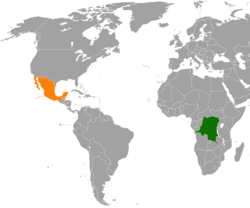Democratic Republic of the Congo–Mexico relations
 | |
DR Congo |
Mexico |
|---|---|
DR Congo–Mexico relations refers to the diplomatic relations between the Democratic Republic of the Congo and the United Mexican States. Both nations are members of the Group of 24 and the United Nations.
History[]
During the Atlantic slave trade, Spain transported many African slaves from the Congo to Mexico where they arrived primarily to the port city of Veracruz.[1] In June 1960, Mexico recognized the independence of Congo-Kinshasa from Belgium. In January 1961, Mexican Foreign Minister Manuel Tello Baurraud, expressed his regret at the death of former Congolese Prime Minister Patrice Lumumba.[2] In the 1968 Summer Olympics, Congo-Kinshasa participated in its first olympics in Mexico City.
The DR Congo (at the time known as Zaire) and Mexico formally established diplomatic relations on 31 July 1975.[3] Since the establishment of diplomatic relations, relations between both nations have primarily taken place at international forums such as at the United Nations. Mexico, as a non-permanent member of the United Nations Security Council from 1980 to 1981 and again from 2002 to 2003; voted for resolutions addressing the situation in the DR Congo. Some of these resolutions were the following: UN Resolution 1399, 1417, 1445, 1457, 1896, 1906, 1925 and 1952 (to name a few). In 2007, Mexico accredited for the first time its ambassador resident in Addis Ababa, Ethiopia to the government of the DR Congo.[3]
In December 2010, Congolese Minister of the Environment Tosi Mpanu Mpanu attended the 2010 United Nations Climate Change Conference held in Cancún, Mexico.[4] In April 2014, Congolese Minister for Planning Celestin Vunabandi Kanyamihigo paid a visit to Mexico. In May 2014, Congolese Vice Minister for Cooperation Dismas Magbengu Swana Emin also paid a visit to Mexico to attend a conference.[3] In November 2014, Mexican ambassador to Ethiopia, Alfredo Miranda Ortiz, attended the “Africa Regional Meeting” being held in the Congolese capital of Kinshasa.[5]
In early 2019, several hundred Congolese migrants entered Mexico en route to the United States. Many of the Congolese migrants are asylum seekers fleeing political violence in their country of origin and from the Ebola virus. Many of the migrants were also coming from Angola which expelled more than 300,000 Congolese refugees from the country in 2018.[6] As a result of strict immigration laws in the United States, many of the Congolese migrants have asked for asylum in Mexico not wanting to return to the DR Congo.[7]
High-level visits[]
High-level visits from the DR Congo to Mexico
- Minister of the Environment Tosi Mpanu Mpanu (2010)
- Minister for Planning Celestin Vunabandi Kanyamihigo (2014)
- Vice Minister for Cooperation Dismas Magbengu Swana Emin (2014)
Scholarship[]
The Mexican government offers each year scholarships for nationals of the Democratic Republic of the Congo to study postgraduate studies at Mexican higher education institutions. In addition, Mexico has a community of Congolese, some of whom are prominent professors who are part of the teaching staff of public and private universities in the country.[3]
Trade[]
In 2018, trade between the DR Congo and Mexico totaled US$2.3 million.[8] DR Congos's main exports to Mexico include: timber (of various species) and merchandise for the Sectoral Promotion Program of the Mining and Metallurgical Industry. Mexico's main exports to the DR Congo include: cards equipped with an electronic integrated circuit or "smart cards"; wire rod made of carbon steel and alloy steel; meats and eggs.[3] Between 1999 and December 2015, the DR Congo invested US$4.9 million in Mexico, mainly in the mining sector.[9]
Diplomatic missions[]
- DR Congo does not have an accreditation to Mexico.[9]
- Mexico is accredited to the DR Congo from its embassy in Addis Ababa, Ethiopia.[10]
See also[]
References[]
- ^ Afrodescendientes en México (in Spanish)
- ^ El Primer Acercamiento de México y África Subsahariana (pg. 107 in Spanish)
- ^ a b c d e Bilateral relations between Mexico and the DR Congo (in Spanish)
- ^ Summary of the Cancun Climate Change Conference
- ^ SRE: Acciones de Política Exterior en África, Medio Oriente y Asia Central: Profundización y Diversificación (in Spanish)
- ^ Hundreds of Africans tried to reach the United States. Now they’re stuck in Mexico.
- ^ De Congo a México: 20.000 kilómetros de odisea a ningún lugar (in Spanish)
- ^ Mexican Ministry of the Economy: DR Congo (in Spanish)
- ^ a b República Democrática del Congo (in Spanish)
- ^ Embassy of Mexico in Ethiopia
- Bilateral relations of the Democratic Republic of the Congo
- Bilateral relations of Mexico

